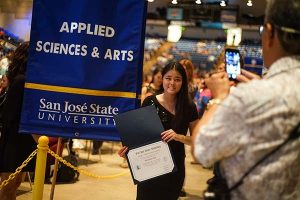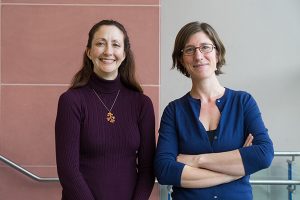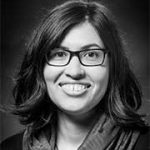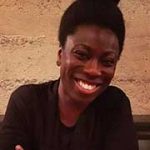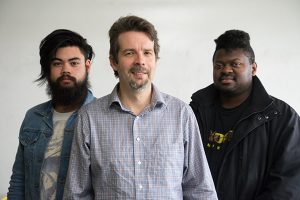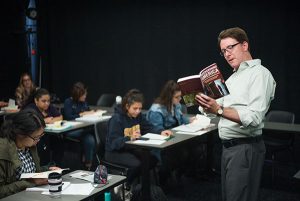
Dr. Matthew Spangler teaches at San Jose State University on Wednesday, Sept. 20, 2017. (James Tensuan/San Jose State University)
By David Goll
Dr. Matthew Spangler enjoyed a summer of achievement in 2017—based on a mixture of long-running professional successes, recurring events, and brand new honors.
In August, Dr. Spangler, associate professor of Communication Studies, became the first San José State University faculty member to win the prestigious Leslie Irene Coger Award for Distinguished Performance. Since 1994, the National Communication Association has bestowed the honor annually to teachers, directors, producers or performers who’ve created a body of live performances. He will receive his award during the Washington D.C.-based organization’s annual conference in Dallas in November.
“I’m honored and flattered to receive this award,” said Dr. Spangler, a member of the SJSU faculty since 2005. “We in this field are not in it for the awards, but it’s very nice to be recognized.”
The award was announced roughly at the same time as the 15th production of his stage version of The Kite Runner—the former number one New York Times best-selling novel by Khaled Hosseini—was wrapping up its eight-month run at two different theaters in London’s famed West End theater district. Dr. Spangler adapted the novel, which was also turned into a successful 2007 movie, for the stage and was first performed at San José State that same year and then by theater groups throughout the U.S.
The professor/playwright said he has modified the play over the years by adapting the script to better reflect current events, including adding new characters to keep “The Kite Runner” relevant. The British production gave added emphasis to the experience of Afghan characters emigrating to the East Bay city of Fremont.
Two graduate students working towards Master’s degrees in Communication Studies, Jenni Perez and Abigail Nuno, were among a small group of San José State students who made the trip to London last December to view the production.
“Being given the opportunity to see Dr. Spangler’s play in London was without a doubt one of my favorite experiences during my time in the graduate program,” Perez said. “…I was introduced to the cast of the play and had the chance to hang out with them afterward. They wanted to ask our opinions of their American accents.”
Describing it as one of her favorite novels, Perez said she was transfixed seeing the book turned into a stage play.
“Though I always hoped to watch ‘The Kite Runner’ play in person, I never imagined my first time would be in London of all places,” she said.
Nuno said other than losing feeling in her toes from the December chill of London; she has great memories of the trip to Europe.
“The theater was gorgeous and the play was a great representation of the book,” she said. “It was awesome to see a crowd of people just as passionate about the story as we were. My father also came to London with us and went to the play. He had never read the book and still enjoyed it as much as we did.”
Both Nuno and Perez said they’re inspired by their professor.
“Dr. Spangler is an instructor who is very passionate about immigration,” Nuno said. “He has many accomplishments in the field, so he likes to tie them into our class.”
After the London productions, which drew audiences of about 100,000 from December to August, Dr. Spangler said that “The Kite Runner” is touring the U.K. until June.
It was a busy summer—Dr. Spangler also presided over his third National Endowment for the Humanities Summer Institute for School Teachers, from June 25 to July 9, since 2014. This year’s event for 25 K-12 teachers from throughout the nation, titled “The Immigrant Experience in California Through Literature and Theatre”, featured talks by well-known academics and such authors and playwrights as Khaled Hosseini, Maxine Hong Kingston, and Luis Valdez. Also included were field trips around the Bay Area, including to Angel Island—known as the Ellis Island of the West—because of its immigration station operating from 1910 to 1940 that processed 500,000 immigrants.
Dr. Spangler and his former colleague, Dr. David Kahn, professor emeritus from the SJSU Television, Radio, Film & Theatre department, received a $168,000 grant from the NEH to stage the Institute. Participants’ airfare was covered, as well as lodging at the Fairmont San José hotel and a small food allowance. It was one of about two dozen such gatherings sponsored by the NEH.
“We get 150 applications for 25 spots,” said Dr. Spangler, who also teaches courses on immigration. “All of the instructors are teaching immigration issues in their classes, in a variety of subject areas.”
Luis Valdez, writer and director of such acclaimed films as “Zoot Suit” and “La Bamba,” is considered the founder of modern Chicano theater and film. A former SJSU student, Valdez was joined as a speaker at the Institute by his son, Kinan Valdez. The elder Valdez is the founder and artistic director of El Teatro Campesino, the renowned San Juan Bautista theater company, where his son is also an actor and director.
